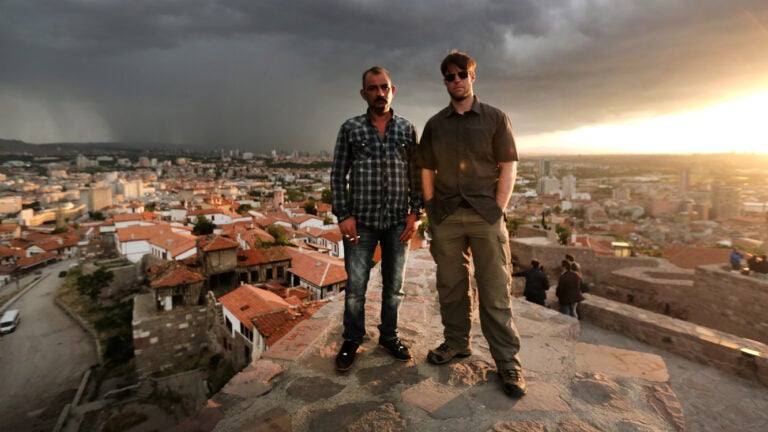
Chase Millsap and The Captain | Photo by Spencer Millsap
Marine Veteran Strives to Bring Wartime Allies to Safety
Brothers in arms, they’re now a world apart.
“Your word is the most important thing you have.”
That’s what his grandfather, a World War II combat veteran, had told Chase Millsap MPP ’16 before he left for the Naval Academy in 2001. After Millsap’s 15 years and three deployments to Iraq, those words have never seemed more urgent to the former U.S. Marine infantry officer and Green Beret.
Millsap was beginning his master’s program at the USC Price School of Public Policy in 2014 when his brother-in-arms, an allied Iraqi Security Forces officer, called him in desperation. ISIS had ordered the man to leave Iraq, threatening to kill his wife and two children if he didn’t go.
This is a man I trusted every single day when the world seemed to be crashing around us.
Chase Millsap
As his friend spoke in rapid Arabic, Millsap could hear the gunfire in the background. Millsap promised he’d try to help “The Captain” find safety. (He calls him that to protect his identity.)
It was the least he could do. In 2006, The Captain saved Millsap’s life, pushing him to the ground and running straight into sniper fire at their dusty checkpoint in Al Anbar province. The two worked together again in 2007, training 700 Iraqi soldiers near the Syrian border.
“That’s where we became more than friends,” Millsap says. “We were brothers. This is a man I trusted every single day when the world seemed to be crashing around us. It was a dangerous time to be in Iraq and I know The Captain helped keep many Americans safe, not just me.”
When Millsap left Iraq after his third and final deployment, it seemed peace was returning to the streets. “I left with my head held high. I thought we as Americans had done our job and given Iraq a chance for a bright future.”
By 2014, ISIS turned peace to war and The Captain’s life was in grave danger.
A few phone calls should rescue him, Millsap thought. Instead, he found a maze of dead ends cemented in policy. Allied military fighting alongside American troops don’t qualify for asylum because, unlike civilian contractors, they are paid through their own government—even though the U.S. finances those security forces.
“It didn’t make sense to me that we would abandon our most trusted allies,” Millsap says. He set out to raise awareness and reverse policy on America’s wartime allies. In late May, he traveled to Washington, D.C., to speak on a congressional panel. He hopes to return for a full congressional hearing next year.
He also founded the Ronin Refugee Project, a nonprofit that champions wartime allies seeking refugee status and resettlement in the United States. Ronin is an ancient Japanese term for a masterless warrior. The group recently merged with No One Left Behind, and in September they delivered a letter to Congress signed by 25 generals. The group also hopes to present a comprehensive policy on wartime allies to the Department of Defense.
National Geographic recently told The Captain’s story. In a 24-minute documentary, Millsap, now 33, traveled to Turkey to reconnect with his old friend. Injured by a roadside bomb, his short-term memory gone, his right arm useless, the battered Iraqi officer had spent his life savings to reach southern Turkey, where his family, along with his widowed sister and her three children, now live in limbo. The Captain may be considered for resettlement by next year but meanwhile they wait their turn with millions of other refugees fleeing ISIS.
Millsap believes there are thousands of other heroes out there. He’s determined to help as many as he can.
